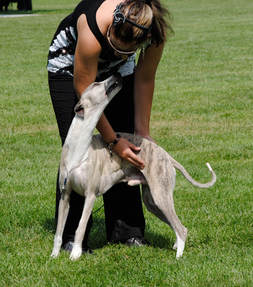Whippet Basics
A quick run-down on the Whippet
Size: Medium (under 20kg)
Health: Generally a healthy breed , with minimal genetic issues (more on health below)
Life Span: 12-14 years
Coat Length: Short.
Inside/Outside: Inside. They can be outside dogs so long as they are rugged at night in a draft free kennel (cold months) but mostly Inside.
Grooming Required: Maintenance baths as required (or if they start to smell or roll in animal poo!)
Intelligence: They are an intelligent breed, so training them can be frustrating and requires ALOT of patience.
Activity Level: Average to high, they have energetic 'zoomies' and then happy to sleep for the rest of the day - there are individuals that fall outside of this though!
Guarding Ability/Barking: Minimal, if you want them to chase out the intruders, your probably out of luck.
Hunting/Prey drive: High. They are a sighthound and bred for hunting small game like rabbits, so having them with cats etc requires patience and training.
Feeding: The whippet is cheap to feed.
Misc:
- They tend to get carsick as puppies (usually grow out of it in time)
- Whippets are collectible, you have been warned!!
- Whippets are stuck to you like glue, and if not properly trained can suffer separation anxiety. Ensure your whippet is well trained and adjusted to deal on its own.
Size: Medium (under 20kg)
Health: Generally a healthy breed , with minimal genetic issues (more on health below)
Life Span: 12-14 years
Coat Length: Short.
Inside/Outside: Inside. They can be outside dogs so long as they are rugged at night in a draft free kennel (cold months) but mostly Inside.
Grooming Required: Maintenance baths as required (or if they start to smell or roll in animal poo!)
Intelligence: They are an intelligent breed, so training them can be frustrating and requires ALOT of patience.
Activity Level: Average to high, they have energetic 'zoomies' and then happy to sleep for the rest of the day - there are individuals that fall outside of this though!
Guarding Ability/Barking: Minimal, if you want them to chase out the intruders, your probably out of luck.
Hunting/Prey drive: High. They are a sighthound and bred for hunting small game like rabbits, so having them with cats etc requires patience and training.
Feeding: The whippet is cheap to feed.
Misc:
- They tend to get carsick as puppies (usually grow out of it in time)
- Whippets are collectible, you have been warned!!
- Whippets are stuck to you like glue, and if not properly trained can suffer separation anxiety. Ensure your whippet is well trained and adjusted to deal on its own.
Whippet History - Why was the whippet developed?
Known as the "poor mans Greyhound", the Whippet was used to hunt small game for the poorer people as they were cheap to feed and easy to keep.
A common saying is "they are bred to fill the stew pot and warm the bed"
Whippet-type dogs have been around for 100's of years and the whippet was developed using greyhounds, terriers, spaniels and any other breed at the time the hunters thought would benefit from the mix.
The whippet was recognized by the English Kennel Club in 1891.
A common saying is "they are bred to fill the stew pot and warm the bed"
Whippet-type dogs have been around for 100's of years and the whippet was developed using greyhounds, terriers, spaniels and any other breed at the time the hunters thought would benefit from the mix.
The whippet was recognized by the English Kennel Club in 1891.
What can you do with Whippets?
Whippets excel in Lure Coursing but can also compete in fly ball, rally, obedience, dog showing and most other canine sports.
The use of whippets for therapy dogs is also on the rise.
The use of whippets for therapy dogs is also on the rise.
Whippet Health Issues?
Most Whippets do very well with regular vet checks, vaccination as recommended by your veterinarian, a healthy diet, heartworm and external parasite preventative as recommended for your area of residence, regular nail trims, and attention paid to their dental health.
To maintain your Whippet’s health, it is important to feed a quality food, give plenty of fresh water and provide a warm, dry place to sleep.
Genetic eye defects have been found in the breed, but are still quite uncommon.Genetic eye diseases resulting in blindness or vision problems to younger dogs are very rare. Very elderly Whippets, as with any other dog, may gradually experience reduced vision and hearing.
Congenital deafness is also rare, but at least can be spotted in very young puppies. Deaf Whippets can make successful pets if trained to hand signals and kept safe from traffic (which hearing Whippets often ignore as well).
Hypothyroidism is present in the breed, but again, is relatively uncommon compared to what can be seen in some other breeds.
Addison’s disease and certain autoimmune blood and skin disorders are also rare, but have been documented
Opinion is divided as to whether or not having just one, or no, testicles normally descended in the scrotum should be classed as a health problem, but to be sure, an undescended testicle is at an increased risk for turning cancerous, and should be removed.
Cardiac disease in the Whippet is an area of mounting concern, some of it driven by increased sensitivity of diagnostic testing, but also by the perception, widely-held, that cardiac problems have been increasing in the breed in recent years.
Some Whippet puppies are born with mild murmurs, which they outgrow, but any murmur should be considered serious enough to warrant an echocardiogram by an experienced veterinary cardiologist. Many Whippets have what is known as an “athletic” or “flow” murmur throughout their lives.
These murmurs are innocent and an echocardiogram will confirm this, however, a portion of the Whippet population has some degree of minimal to mild mitral valve regurgitation, which can progress to significant mitral valve disease. While many Whippets live a long time with mitral valve murmurs, a percentage of these will progress to congestive heart failure and/or cardiomyopathy at an unacceptably young age.
Again, the echocardiogram administered by a cardiologist familiar with Whippet hearts is the way to assess whether or not a murmur heard by your general practice veterinarian warrants medication and follow-up, or whether it is simply a flow murmur
Geriatric Whippets, even those whose hearts have been healthy in their youth, may develop some mitral or tricuspid valvular disease in their old age. Cardiac insufficiency, which shows up for the first time at ages of 12 and up is not considered genetic, but a by-product of the aging process in those dogs which are affected. Many geriatric Whippets live for several years after diagnosis while on one or more of the cardiac medications available.
Cancer is also a problem that is seen in elderly Whippets, along with kidney disease, but it is not a current area of interest in genetic research in Whippets. Elderly Whippets will eventually succumb to something, and whether it is cancer, kidney failure, or cardiac disease, the last and best thing we can do for our beloved companions is to ease their passage when there is nothing more that can be done to alleviate their discomfort. With luck, and the continued dedication of the breeders and the owners of our beloved breed, this is not a decision many of you will have to make until your Whippets have enjoyed a long, healthy and mostly-active life.
Reference; American whippet club
To maintain your Whippet’s health, it is important to feed a quality food, give plenty of fresh water and provide a warm, dry place to sleep.
Genetic eye defects have been found in the breed, but are still quite uncommon.Genetic eye diseases resulting in blindness or vision problems to younger dogs are very rare. Very elderly Whippets, as with any other dog, may gradually experience reduced vision and hearing.
Congenital deafness is also rare, but at least can be spotted in very young puppies. Deaf Whippets can make successful pets if trained to hand signals and kept safe from traffic (which hearing Whippets often ignore as well).
Hypothyroidism is present in the breed, but again, is relatively uncommon compared to what can be seen in some other breeds.
Addison’s disease and certain autoimmune blood and skin disorders are also rare, but have been documented
Opinion is divided as to whether or not having just one, or no, testicles normally descended in the scrotum should be classed as a health problem, but to be sure, an undescended testicle is at an increased risk for turning cancerous, and should be removed.
Cardiac disease in the Whippet is an area of mounting concern, some of it driven by increased sensitivity of diagnostic testing, but also by the perception, widely-held, that cardiac problems have been increasing in the breed in recent years.
Some Whippet puppies are born with mild murmurs, which they outgrow, but any murmur should be considered serious enough to warrant an echocardiogram by an experienced veterinary cardiologist. Many Whippets have what is known as an “athletic” or “flow” murmur throughout their lives.
These murmurs are innocent and an echocardiogram will confirm this, however, a portion of the Whippet population has some degree of minimal to mild mitral valve regurgitation, which can progress to significant mitral valve disease. While many Whippets live a long time with mitral valve murmurs, a percentage of these will progress to congestive heart failure and/or cardiomyopathy at an unacceptably young age.
Again, the echocardiogram administered by a cardiologist familiar with Whippet hearts is the way to assess whether or not a murmur heard by your general practice veterinarian warrants medication and follow-up, or whether it is simply a flow murmur
Geriatric Whippets, even those whose hearts have been healthy in their youth, may develop some mitral or tricuspid valvular disease in their old age. Cardiac insufficiency, which shows up for the first time at ages of 12 and up is not considered genetic, but a by-product of the aging process in those dogs which are affected. Many geriatric Whippets live for several years after diagnosis while on one or more of the cardiac medications available.
Cancer is also a problem that is seen in elderly Whippets, along with kidney disease, but it is not a current area of interest in genetic research in Whippets. Elderly Whippets will eventually succumb to something, and whether it is cancer, kidney failure, or cardiac disease, the last and best thing we can do for our beloved companions is to ease their passage when there is nothing more that can be done to alleviate their discomfort. With luck, and the continued dedication of the breeders and the owners of our beloved breed, this is not a decision many of you will have to make until your Whippets have enjoyed a long, healthy and mostly-active life.
Reference; American whippet club
Disclaimer: This information is to be used as a reference only.










